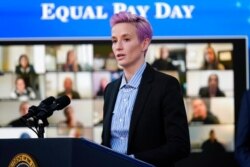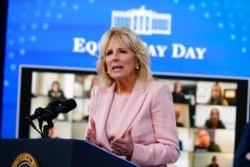President Joe Biden and first lady Jill Biden highlighted the gap in pay between American men and women in an event marking Equal Pay Day on Wednesday with members of the U.S. national women's soccer team.
"My administration is going to fight for equal pay," Biden said. "It's about justice, it's about fairness, it's about living up to our values, who we are as nation. Equal pay makes all of us stronger."
Equal Pay Day is commemorated in the U.S. on a different date every year and marks how many more days the average American woman must work in order to earn what the average man made in the previous year.
American women working full time, year-round are paid on average 82 cents for every dollar paid to men, according to data from the National Women's Law Center. The data show that the pay gap is much larger for Black women, who earn 63 cents on the dollar of the average man, and Latina women, who earn 55 cents. The same data show a gender wage gap exists in 94% of occupations.
Cecilia Rouse, chair of the White House Council of Economic Advisers, said the administration is taking actions to reduce the gender pay gap, including by supporting the Paycheck Fairness Act reintroduced last month in Congress, pushing for paid family leave and making child care more affordable.
"The Biden-Harris administration is working to make sure our daughters have the same opportunities that our sons do," Rouse said in a Wednesday briefing to reporters.
Administration officials have focused on addressing gender disparities in economic opportunity and labor as part of Biden's Build Back Better plan and his agenda for women, a welcome sign to some analysts.
"[It] is a good sign that the administration is viewing the problem of pay inequity within a much larger ecosystem that has long ignored systemic biases and inefficiencies that perpetuate gender-based inequities in economic well-being and outcomes," said Kelly Dittmar, director of research at the Center for American Women and Politics at the Eagleton Institute of Politics at Rutgers University–Camden.
The president's invitation to the U.S. national women's soccer team highlights the players' role in raising awareness on the gender pay gap. The team members sued the U.S. Soccer Federation in 2019, claiming they had not been paid equitably compared with what the men's team received. The next hearing in the case is expected in June.
Team members attending the White House event included star Megan Rapinoe, who vowed in 2019 she would not visit the White House while Donald Trump was in office. Rapinoe, who is a lesbian and an activist for equal pay, feuded with Trump on Twitter over policies she viewed as anti-gender equality and anti-LGBTQ.
The two-time World Cup champion highlighted the struggles of female professional athletes. "Despite those wins, I've been devalued, I've been disrespected and dismissed because I am a woman. And I've been told that I don't deserve any more than less, because I am a woman," Rapinoe said. "Despite all the wins, I'm still paid less than men who do the same job that I do."
Equal Pay Day hearing
On Wednesday, the House Committee on Oversight and Reform held a hearing in honor of Equal Pay Day to examine the economic harm caused by long-standing gender inequalities, which has been exacerbated by the coronavirus pandemic, particularly for women of color.
Republicans have blocked the Paycheck Fairness Act, citing that comparison between men's and women's pay is not "apples to apples" and is often caused by women's own career decisions.
"It's not because of widespread discrimination," Republican lawmaker Nancy Mace said at the hearing, adding that "women in general are willing to trade higher pay for more flexibility."
Conservatives claim laws forcing closure of the pay gap leaves little room for individual choice.
"Legislation aimed at closing the so-called pay gap could result in one-size-fits-all jobs and pay schedules," said Rachel Greszler, research fellow with the conservative-leaning Heritage Foundation.
That notion was rejected by C. Nicole Mason, president of the Institute for Women's Policy Research, who testified at the hearing.
"It is a result of systemic undervaluing of women's contributions, skills and talents to the workforce and society," Mason said. "We can and should do better."
Pandemic impact
The gender wage gap has widened because COVID-19 has pushed women out of the workforce.
"There are now 4.2 million fewer women working than there were in February of 2020, in large part because of the pandemic," said Heather Boushey, member of the Biden administration's Economic Council of Advisers.
First lady Dr. Jill Biden underlined the urgency of addressing the pay gap exacerbated by the pandemic. "This issue is so much bigger than the number on a paycheck. Our work gives us a sense of purpose," she said.
The long-term costs of these lost paychecks and time out of the workforce will be high if policymakers don't invest in a strong recovery for women, said Jessica Mason, senior policy analyst at the National Partnership for Women & Families.
Mason added that because the pay gap counts only women and men who have jobs, it perversely might appear to improve in this year's economic data because the pandemic destroyed the jobs of so many women at the bottom of the pay scale. "Policymakers should beware of the statistical mirage," said Mason.
The U.S. ranks 53rd in the latest Global Gender Gap Report, far behind other developing countries.






